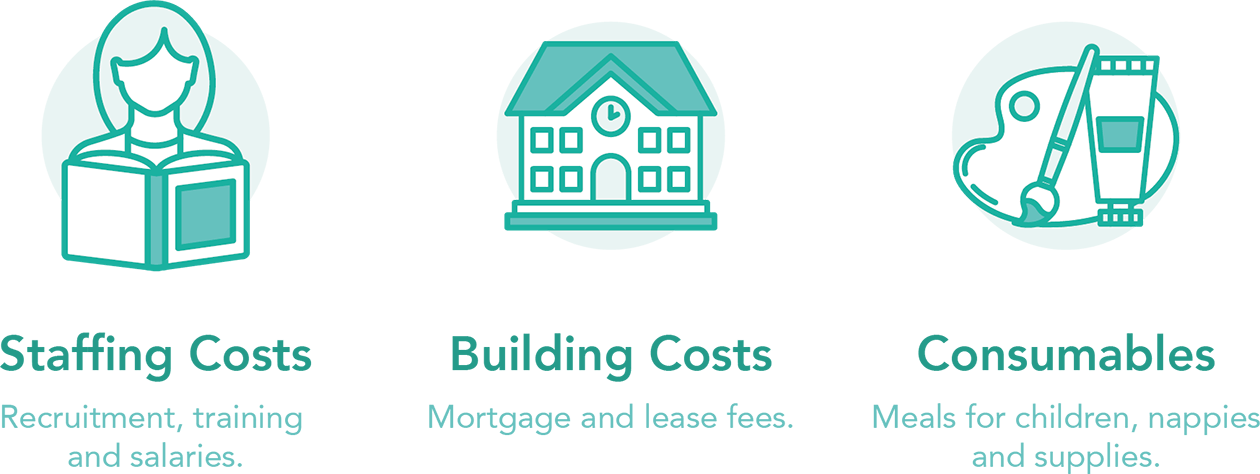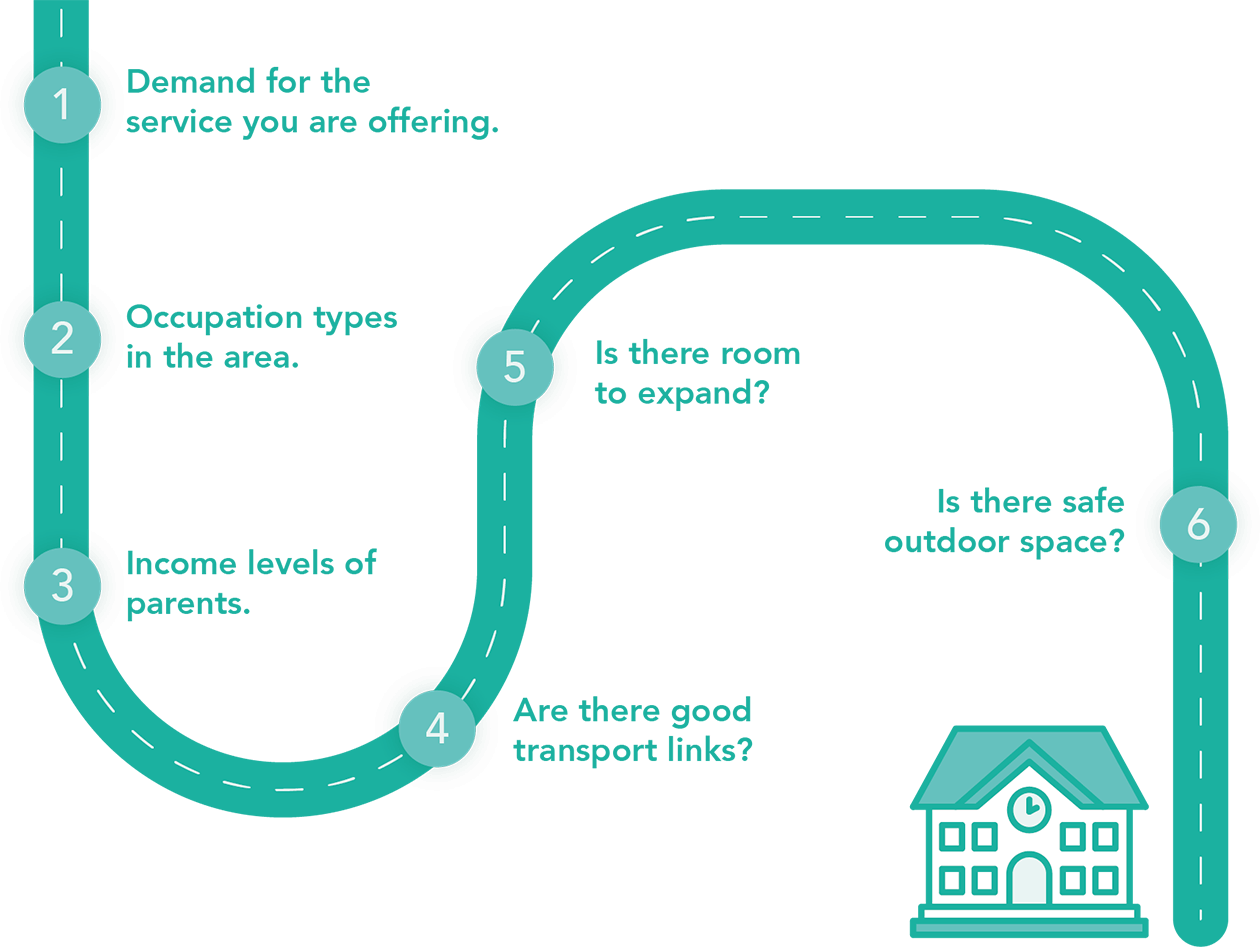Just as with any business, starting is probably the most exciting – and daunting part. In an industry where demand is only increasing, looking at how to run a nursery business – a successful nursery business – could reach enormous potential for you and your entrepreneurial goals.
Take for instance this report from the Department of Education, which indicates that in 2019 there were 24 000 group-based Early Years providers. This levels out to about 14 700 private nurseries and 8 600 voluntary nurseries. It’s no wonder you’re looking for a piece of the pie.
How to Start your own Nursery Business
What is the reason for starting a nursery?
Give children the best possible start to their education journey:
It’s no secret how important the early years are for a child’s learning and development. Perhaps you want to be part of this to help ensure the highest quality. After all, nursery school is the beginning of a child’s education journey.
Participate in a successful industry with high potential:
Considering that nurseries remained open even during our third national lockdown, nursery schools are in high demand. As more parents are able to work, and new government schemes are introduced nursery businesses are growing – and quickly.
Be your own boss:
This one is self-explanatory, but the freedom of working for yourself is what attracts many to start their own businesses.
Strike while the iron is hot:
It’s now simpler than ever to start up a nursery due to Covid-19. In an odd turn of events, there’s less work involved. Check out the Government website for the specifics. With Covid-19 laying waste to the struggling high streets, the government has fast-forwarded its overhaul of its building use category system, enabling people to convert retail, restaurant and even office units into day nursery space without the need to apply for change of use.
Is it the right decision for me?
The first step at how to start your own nursery business is making sure it is the right decision for you. Many struggle with this, so feeling anxious about this decision is normal. Before you take the leap, consider the following:
Do you have a true love for children’s learning and development?
Regardless of whether you plan to work with the children directly or not, this value set will drive you to create a successful nursery business.
How are your management skills?
Even small nurseries will have a team of 5-10 people and larger settings will be 30+. Practitioners come in all shapes and sizes and therefore you will be managing a diverse group of people. A key element to success is how well you manage.
Can you handle jumping from one take to the next?
Very often, nurseries starting out have the owner wear many hats: Nursery manager, finance manager, marketer, practitioner and so on. You could go from assisting with nappy changes, to drafting edits to your finance model, to dealing with a grumpy parent. Are you able to adjust and remain unflustered?
Insider Tip:
Make sure you enjoy operational tasks and processes, as your success to a big degree rests on how well you manage these ( in addition to the core element of caring for children). Other functional areas such as finance, optimising costs, and marketing are critical. If no one knows about your amazing childcare it’s pointless. Of course, focussing on delivering high quality childcare has a knock-on effect on everything else.
Is it essential to have any specific qualifications and/or experience? If so, what are they?
As a registered person or a nominated person, you do not need to have any Ofsted qualifications yourself to be the registered person. However, you must ensure that you have enough knowledge to understand how you will deliver the EYFS and understand (at a minimum standard) how you are able to manage and oversee a nursery manager – who in turn has that specific skill set to deliver the EYFS in detail including all statutory requirements. It comes back to the multifunctional approach starting a nursery business entails.
Look at where you add value to the nursery you own. As much as you’d like to, you can’t be an expert in everything. Success will come from knowing where you contribute and knowing where you have gaps in your skill set. Either fill it with people you hire or external services.
How do you find out if it’s financially viable for you?
It may come as no surprise that you need a very clear financial model when looking at how to start a nursery business. Although we may do it for the children, it is ultimately a business with a bottom line. And as with any business, it comes with risks. Assess carefully your:
Fee structure, and for this you must look at occupancy. What does your occupancy need to be? Looking at these numbers will give you a clear income forecast. We recommend assessing your income forecast for the next 3 years.
How to do this using Blossom?
Occupancy reports and Financial Forecasting reports on the Blossom platform help our customers to manage their finances correctly and easily.
Of course, in an ideal world your occupancy would grow to 80% within the first year. It does happen, however, most likely it will be a gradual growth process. Therefore, in your financial planning you need to be prudent. Understand what your financial portfolio would look like in the worst case scenario. Rather over estimate than under and be prepared, than find yourself in trouble later. Main point is, ensure it is a realistic approach.
A key success factor is identifying what your costs will be. It’s very easy to forget or miss out on potential costs. Therefore, we suggest getting expert advice from an accountant or an Early Years specialist. This way, you can ensure you are informed of all costs you will incur when running a nursery.
Generally, your top 3 costs will be:

Obvious costs may come to mind such as insurance, accountancy fees, and services charges. Less obvious are elements include: security costs, repairs and renewals (which are ongoing costs of maintaining your building), waste disposal, and training costs particularly when there are certain statutory requirements for qualifications that your staff must have.
Model all of this out and validate it with a professional.
What are some initial set-up costs?
- Building: and any building or redevelopment that comes with it
- Recruitment costs: building a team (often there is a need to use external services for this)
- Materials: furniture for children and staff, teaching resources
- Marketing getting your business out there and known to the community
These are all large costs you will incur up front before a child even steps foot in your nursery.
Starting up our own nursery, we were shocked at the price of external recruitment services. The scarcity of nursery practitioners is an ongoing issue. We needed to use external recruitment services to ensure we build the best team, and the amount spent was a shock to us.

What insurance cover do you need?
You will need to look at a few in detail. Unsurprisingly, starting a nursery requires a few insurance policies. Such as professional liability insurance, building insurance and so on. Organisations like the NDNA can assist with clarity on policies you need and connect you with the proper insurance providers.
What insurance you may need:
Public liability insurance:
To cover costs of any potential injury or sickness experienced by a member of the public (such as a child) on your premises. This can be staff administering non-prescribed medication, allergic reactions, and injuries on your play equipment.
Employer’s liability insurance:
To cover costs of potential injury or sickness experienced by a member of staff while on your premises. It is critical to display the certificate of this insurance clearly in your nursery.
Professional indemnity insurance:
To cover you in the case you give out expert advice to parents or children which turns out to be incorrect.
Commercial property insurance:
To cover your property (and potentially the contents of your property) in the event of fire, flood, or theft.
Business interruption insurance:
To pay you out a certain amount if your business has to close for a period of time. A useful one during these uncertain times of the Covid-19 pandemic.
Personal accident cover:
If you have an accident and can not work, it will give you financial compensation during this time.
Remember, if you plan to organise trips, make sure that your insurance policies cover staff and children when they are away from the nursery premises.
What makes a solid nursery business plan?
Have a clear understanding of how you will run each of your functional areas. Understand what’s involved. Marketing, Finance. Recruitment. Each needs its own plan. Also consider the external help you will need – whether it’s companies or hired employees.
Therefore you will need to think about what your hiring profile looks like. Ask yourself: what will you be doing as the owner? What are the gaps? Put simply, choosing the right staff and management team underpins your success.
How do you choose a location?
What should you look for when choosing a location for your nursery? Firstly, there needs to be a need in the area for the type of service/child care you are offering. Every local authority has Childcare Sufficiency Assessments which are legally required to be conducted every 3-5 years. This is a good starting point to understand the demand based on local birth rates and the supply (how many nurseries exist).
Often a lack of a certain type of service in an area is a sign that there isn’t a need in the area. For example, if an area does not have a full day service nursery, you should be asking yourself ‘why?’ to assess the area properly.
Look at:
- Occupations (Full time, both working parents?)
- Income levels (Can they afford your service? What do parents in the area expect to pay?)

It will impact your decision of location as in areas of working parents, full time care is generally required. Whereas, in areas with only one working parent there may only be a need for sessional care (where you would be open for 6 hours a day).
How important is establishing a brand?
Branding can mean different things. On one side, it can be your logo, the colours you choose and on the other it’s your nursery’s reputation. Establishing a local brand is important. You want the people in the area to know that you are there. Ways to do this are:
- Speak with customers/potential parents to see what resonates with them.
- Keep it simple and state your value and what you stand for. What matters the most to you?
The quality of services you provide will build your brand for you which will develop over time. It will determine how parents perceive your nursery.
Remember that when it comes to branding, policies and processes are critical. This relates to everything, from safeguarding and recruitment to answering telephones. There is a huge difference between answering with, “Hello this is Rainbow Nursery” versus “Hello.”
And it could mean the difference between a parent lost or gained. It’s one thing having written policies and processes (which you can purchase from organisations such as the NDNA as a useful starting point), however implementing them in another story completely.
How does Blossom help with this?
By uploading the nursery’s policies and procedures onto the platform, these documents are made readily available to staff to check anytime – at the click of a button.
How to Run a Successful Nursery Business
Registering Your Nursery
Your nursery needs to be registered with the specific regulator in your country:
- England Ofsted
- Wales CSSIW (Care and Social Services Inspectorate Wales)
- Scotland the Care Inspectorate
- Northern Ireland the Health and Social Services Board (HSSB)
To register effectively, you must be aged 18 years or older, have the right to work in the UK, and must undergo a Disclosure and Barring Services (DBS) check. This check ensures that you have no criminal convictions that make you unsuitable to work with children. The cost for a DBS check is around £50.
Additionally a health declaration booklet, detailing any health problems that you have and any medication you are taking must be filled in and submitted as well.
Once registered with Ofsted, you can expect graded inspections of your nursery at least once every three years.
Check out our
What makes a good nursery staff?
How can you ensure that you are hiring and building the best team possible? Here are some things to consider:
Do they have the passion?
Caring for children is not for everyone. Gaps in knowledge can be filled with good training programmes. Instilling that core passion in someone however, is much more difficult.
Are they committed?
Are they trustworthy? The ability to show up and deliver without fail is crucial for a nursery business. In this line of business, you ultimately impact the lives of children so if an applicant seems on the fence or you doubt their trustworthiness, keep searching.
What qualifications do they hold?
They should either hold (or be working towards) their Level 2 or Level 3 qualifications. Use this government tool to check if an applicant’s qualifications apply to your setting. Also check if they are trained in Special Educational Needs and Disabilities (SEND). Some children at your setting may require additional support and/or care.
Can they have effective conversations with children?
This sits at the core of high quality education at nursery. Do they communicate with them and not at them? Can they build a rapport with the children? Do they help stretch a child’s imagination, speech and thoughts? What kinds of conversations do they have with children, are they open-ended?
These are the types of questions you need to be asking yourself when considering adding to your team.

Make sure you hire enough staff as there are minimum staffing ratios for nurseries. For example, for every three children under the age of two, you need one adult. And trainees or apprentices under the age of 17 do not count as an adult.
How to do this using Blossom?
With Staff Profiles, Blossom customers have complete visibility over the team- including their qualifications.
How to recruit good staff
Start with an interview. As you know, an interview cannot truly give all the insight needed to gauge someone’s passion and abilities. Include a trial period to test this.
For example, if someone is applying for a Room-based teaching role where they will work with the children, specific members of staff will be allocated to assess them and subsequently provide the recruiting manager with notes of their observations.
It is essential to base the observations off of clear set-out criteria, otherwise it can become very subjective. Create a positive checklist and assess against this to determine the potential employee’s skills and passion. Speak to previous employers directly. Even better, speak with a previous co-worker who worked with the candidate directly to see what their impact and reliability was like.
Conduct practical exercises. A big part of being a practitioner is being able to assess and understand children’s progress and understanding what the steps are for their development is important. Do exercises they will have to do daily in their position, such as writing an observation for a child to assess written abilities, observational skills, IT literacy.
How do you get parents involved in the day-to-day runnings at your nursery?
What is essential to remember is that each 1 child’s positive experience at your nursery results in a possible 5 new children. And it just grows and grows. Your demand generation eventually takes care of itself. Therefore, it is essential to get parents involved.
We recommend establishing a PLG (Parent Liaison Group), made up of representatives from the parent body who meet with the management team at the nursery to provide feedback / thoughts (whether positive or negative), and take communication back to the rest of the parent body. This helps parents feel engaged and involved.
A survey also works. Asking parents what they think works well at the nursery and what needs improvement not only provides you with valuable feedback for your business, but builds that parent relationship. After all, that parent(s) hopefully will be at your setting for a number of years (plus any future children they may have).
We’ve made this easier for Blossom customers with our easy-to-use and modern Parent App. It enables parents to:
- Receive diary updates, highlighting special moments
- Be involved in their child’s learning and development with Learning Journeys
- Continue their child’s education at home with Home Observations
- Enjoy paperless billing with automatic reminders
- Communicate with the nursery instantly with 2 - way messaging
Why not go a step further and try a CLG (Child Liaison Group), and get children from each room involved. Start as young as 3 – children know what they like and what they do not.
How to Scale a Successful Nursery Business
How do you continue the advancement of your staff?
There are two elements to this: an employee’s professional training and development, and then their general well-being. When it comes to training, there are statutory requirements and then upskills. There are two important elements when it comes to training: it must be needs-focussed and high quality.
This training must be focussed on needs, and not generic training rolled out for the sake of it. How do you know what training to pursue? Through performance management processes, such as staff supervisions or observations, you can identify performance improvements that are necessary for staff, whether it be for an individual staff member or a team.
An example is effective child communication. Remember that training does not need to come from an outside source. Get skilled senior staff members/room leaders to head up a training session to share their wealth of knowledge (and real-life experience).
When bringing a new employee on board, identify what particular skill set they each excel in, and assign them to lead training sessions on it for other members of staff. This also creates a sense of responsibility to each team member to help and teach others which in turn creates pride in their work and the training they do.
Alternatively, you are able to hire external trainers to assist with upskilling your staff as well. When doing this remember two things:
- Look carefully at the content and the quality of the training provided.
- What credentials does the trainer themselves have? Will they present the content in an engaging way?
The second factor for continued staff development is their general well-being. How are you able to ensure that your staff are happy and thriving? A number of factors must be considered such as:
Staff workload:
Are they managing the work you assign or barely keeping their nose above water? Make sure that their workload is not overbearing, otherwise you will start to see your staff ill and burnt out.
Support:
Is enough help being provided to staff members? Especially to those that have reached out for it.
Recognition:
Do you acknowledge an employee’s contributions in a positive way? It may sound small, but something like a staff member of the month/quarter/year goes a long way in boosting morale. Additionally, small awards or gifts to acknowledge good work can have a positive impact too. As management, you’re not doing this because you ‘have to’ but because you want to. You have a genuine want for your staff to be happy, healthy and thriving in their life – especially at the workplace.
Social opportunities:
Nursery staff work daily in a high pressure environment. Nursery staff can’t simply have a quick cup of coffee or a smoke break chat – the children are of paramount concern and require their constant attention and care. Therefore, it is important to create social opportunities for them outside of the nursery.
A staff dinner works well for the team at our setting Blossom Tree. Family fun days, where staff have the opportunity to meet and interact with their colleagues’ children and families is a great bonding and social experience.
How to do this using Blossom?
Blossomers have complete control and visibility over Staff Rota, Staff Work Log, Staff Leave and more to ensure that staff are not overwhelmed at any time.
What is your advice for building your reputation in the community?
You are aiming for a positive, localised reputation. A good first step is building visibility that you are in fact there. There are a few ways to achieve this such as:
- Signage
- Sponsor community events
- Host events for young children at your setting (e.g. an open day with fun activities)
- Engage with local press (any events you hold e.g. charity events)
- Set up a website to give out essential information such as location, contact details and services offered but also an “about us” page.
- Create active and engaging social media
- Online advertising (such as Google Ads, Facebook Ads) demographic and location specific can target potential parents well.
Hiring a digital marketing specialist can help get the best results from your online marketing. This may seem over the top, but think about how much one registration is worth to your nursery (and over the years). If you consider that for one child, parents may be paying £1000+ per month for 3 years, the cost of getting that parent on board will be higher because you are effectively securing revenue for your business for the next 3 years.
What steps do you take to ensure the continued growth of your nursery?
This does not need to be complicated. It comes down to two main elements: effective marketing and ensuring you provide the highest quality of care for children at your setting.
Once you have established a good reputation, you will find that your parents will take over to an extent with word of mouth marketing. Eventually, parents will come to your nursery solely based on this, continuing the growth of your business almost for you.
To ensure longevity of your business, you must invest. Invest in your staff and develop your policies (as spoken about above), but also invest in your infrastructure. Make sure that the building always looks fresh, inviting and new. An annual coat of paint works wonders.
Setting aside a ‘resources budget’ is also a good way to ensure that facilities, play things, tools and materials are always updated. All of this combined will attract parents and continue to build your reputation in the industry.
How to do this using Blossom?
Blossom customers are able to take control of their financial status and growth through valuable insight gained from data in reports such as: Revenue reports, Financial Forecasting reports, Debt reports, Funding reports.
What do you think the future holds for the nursery school industry?
I think there will continue to be a demand for childcare, particularly as parents increasingly need to work longer hours as it’s difficult for parents to have sole earners. Therefore the need for childcare will continue to evolve. I also believe that a continued passion for a localised approach will remain.

You will find that even large chain nurseries focus on marketing locally and branding their nursery as ‘the local neighbourhood nursery’ rather than as a big group. We’re one of the few industries where in many ways a single nursery provider has a benefit over large chains because parents want that tailored and personalised approach. And even though big nurseries continue to acquire smaller settings, there will always be a place for those individual nurseries.
